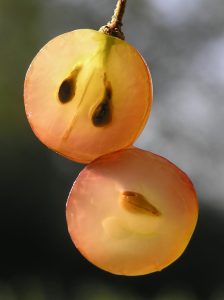Head and neck cancers are some of the most lethal, with a survival rate that has improved little over the decades. Yesterday, one of the many promising lab studies presented here at the American Association of Cancer Research annual meeting, suggests that grape seed extract may play a role in targeting the cancers’ growth.
The laboratory study was led by two former AICR-grantees, both researchers at the University of Colorado Cancer Center: Rajesh Agarwal and Chapla Agarwal
The data presented yesterday during a poster session was published earlier in the year in the journal Carcinogenesis. Here’s the abstract.
The study grew out of the scientists’ lab studies with grape seed extract and prostate cancer, a study funded by AICR. “That led to work in colon cancer where we were seeing good results, so we wanted to look at head and neck cancer,” said Rajesh Agarwal.
The scientists used extract from seeds, not grapes. Grape seeds are a concentrated source of phytochemicals such as polyphenols. After treating head and neck cancer cells with grape seed extract, the researchers saw less cancer cell growth and increased cell death. The extract led to the formation of molecules called reactive oxygen species that caused DNA damage. It also reduced levels of DNA repair enzymes, including Brca1 and Rad51.
Mice fed grape seed extract showed reduced tumor growth and also increased DNA cell damage. Yet there was no damage in the normal cells.
“The interesting thing is that the healthy cells have different mechanisms from normal cells, they are not dependent on one particular pathway. If you target those pathways, the cells collapse.”
The dose was high, “it was nothing that humans could ever take,” said Agarwal. “We are just trying to figure out how grape seed extract works.” The researchers are following up this research with chemopreventive animal studies.
The work was supported by the National Center for Complementary and Alternative Medicine and the National Cancer Institute, NIH.





